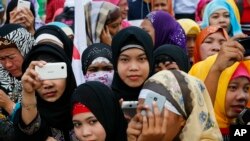The Philippine Congress ended its last regular session of its term Wednesday without passing a Muslim autonomy bill that aims to peacefully settle a decades-long Muslim rebellion in the south, sparking concerns the setback may ignite new fighting.
Lawmakers had until Wednesday to deliberate on the bill before they start a three-month break at the end of the week. The long-delayed legislation is at the heart of a peace deal signed by the largest Muslim rebel group and the government of President Benigno Aquino III, whose term ends in June.
The killing of 44 police commandos in fighting that involved some guerrillas from the Moro Islamic Liberation Front early last year scuttled the early passage of the Muslim autonomy bill outlined in the 2014 peace deal. The separatist conflict has left 150,000 people dead and stunted development in the country's poorest region.
The peace deal, which seeks to provide a more powerful and potentially larger autonomous region to minority Muslims in the south of the predominantly Roman Catholic nation, should have been a major legacy of Aquino's presidency.
While the Malaysian-brokered peace accord remains effective, a new autonomy bill will have to be presented to the new Congress under Aquino's successor. The presidential election is May 9.
"This delays the final settlement,'' said Teresita Deles, the presidential adviser on the talks. "There will be elements that will completely lose hope that this can really be done.''
Government peace negotiator Miriam Coronel-Ferrer said hard-line groups like the Bangsamoro Islamic Freedom Fighters, which opposed peace talks and vowed to continue fighting for a separate Muslim homeland in the south, could exploit the setback.
"They will be emboldened to renew their course in the hope that they will harvest the discontent,'' Ferrer said.
She blamed "the sheer indifference and chronic absenteeism of a majority of the legislators'' in part for the failure to pass the bill, adding, "at this low point, we call for sobriety and perseverance.''
Mohagher Iqbal, a senior rebel leader, has said that delays in the passage of the autonomy bill and efforts to water it down have sparked frustration among guerrillas and Muslims in the south. Residents have staged rallies to protest the delays in two predominantly Muslim cities.
U.S. Ambassador Philip Goldberg said it is crucial for peacemaking efforts to continue and for people to remain vigilant to ensure that extremist groups like the Islamic State group can't spread their influence in the country's south.
About 200 Muslim protesters rallied at the gates of the House of Representatives on Wednesday, calling lawmakers "anti-Muslim and anti-peace'' for not working on the autonomy bill with urgency over the past 17 months.
The bill "has been butchered and is now dead. But we're calling on everybody to remain calm,'' said a protest leader, Kashim Candido.
In 2008, three Muslim rebel commanders led attacks on Christian communities after a preliminary peace pact was not signed and was struck down by the Supreme Court as unconstitutional. The attacks sparked a major military offensive, with the clashes leaving scores of villagers and combatants dead and displacing tens of thousands of people.
Despite the delays, the 2014 peace deal remains valid and will serve as a roadmap for the next administration to finally end the Muslim unrest in the south, Deles said.
Philippines Fears New Fighting With Stalled Muslim Autonomy

MANILA —



